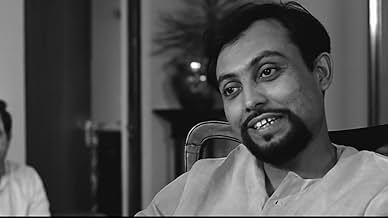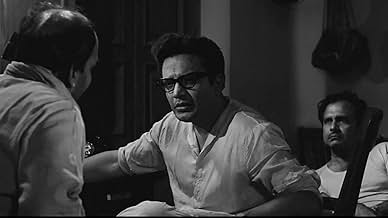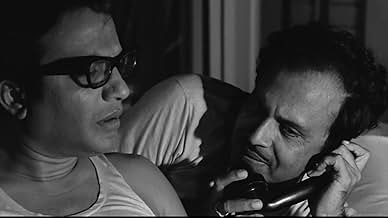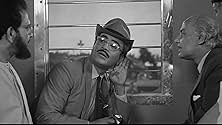AVALIAÇÃO DA IMDb
7,2/10
1,2 mil
SUA AVALIAÇÃO
Adicionar um enredo no seu idiomaByomkesh Bakshi, a detective, is hired by a rich man to investigate the name of an actress appeared in a movie decades ago, who has eloped ever since. The case became complicated when the ri... Ler tudoByomkesh Bakshi, a detective, is hired by a rich man to investigate the name of an actress appeared in a movie decades ago, who has eloped ever since. The case became complicated when the rich man is murdered by someone for that.Byomkesh Bakshi, a detective, is hired by a rich man to investigate the name of an actress appeared in a movie decades ago, who has eloped ever since. The case became complicated when the rich man is murdered by someone for that.
- Prêmios
- 2 vitórias no total
Nripati Chatterjee
- Mushkil Mia
- (as Nripati Chattopadhyay)
Shekhar Chatterjee
- Ajit Bandopadhay
- (as Shekhar Chattopadhyay)
Subhendu Chatterjee
- Bijoy
- (as Subhendu Chattopadhyay)
- Direção
- Roteiristas
- Elenco e equipe completos
- Produção, bilheteria e muito mais no IMDbPro
Enredo
Você sabia?
- CuriosidadesThe film was initially meant to be directed by one of Satyajit Ray's assistant directors, who asked Ray to direct the first couple of days to get things started and then asked him to direct the whole thing as he didn't feel up to the task. Ray reluctantly agreed, as he was having trouble funding Goopy Gyne Bagha Byne (1969), but felt he lacked preparation and didn't connect with the subject matter, later referring to the finished work as his "most unsatisfying film".
Avaliação em destaque
(Reviewed on the basis of watching on T.V. 36 years after release)
Plot: An ex-judge Nishanath Sen, invites the famous sleuth Byomkesh Bakshi and his associate Ajit to his residential colony. The colony is inhabited by peculiar people most of whom are social outcasts; and hence has got the name 'chiriyakhana' (zoo). Nishanath also asks Byomkesh to inquire about all the details of a singer-cum-heroine of an erstwhile Bengali film. Soon, news arrives that Nishanath has been brutally murdered in his colony. Will Byomkesh be able to nab the culprit from among the weird residents of the 'chiriyakhana'?
Review:Byomkesh Bakshi, the dhoti-panjabi clad Bangalee gentleman sleuth who prefers to call himself a 'satyanneshi', has been a household favourite since being introduced by Sharadindu Bannerjee in the 1930's. As a result when it was announced that Uttam Kumar and Satyajit Ray, the greatest star and director in the history of Bengali cinema respectively would again join forces one year after the classic 'Nayak' (1966) to bring one of the biggest Byomkesh-bestsellers 'Chiriyakhana' onto the big-screen; expectations were bound to be sky-high. Were the expectations fulfilled? Depends on whether the viewer is a Byomkesh fan or not.
If one is a die-hard fan of the 'satyanneshi'-stories and expects to see an equal reflection of the sleuth in Uttam Kumar; then there is a clear word of advice: STAY FAR AWAY! For it should be made clear at the beginning itself that barring the title of the story and names of the characters, the whole story and characterizations have been altered inside-out by the director, including Byomkesh and his accomplice Ajit. This Byomkesh is a complete Ray-product bearing no stamp of Sharadindu.
Let us start from the beginning. A unique charm and specialty about Byomkesh has been the fact that he is married, is a father and is as worldly-minded like any common Bangalee; and yet he never allows that to be a hindrance to his profession. This makes his task more challenging than a Sherlock Holmes or a Feluda. But Ray models Byomkesh on his own creation Feluda and makes him a bachelor. Instead the forever-bachelor Ajit becomes a married man here. Another shock which the viewers are exposed to right at the start is Basuki, a snake which has been domesticated by the on-screen Byomkesh but would have been unimaginable for the literary Byomkesh who is a common family-man. So was the skeleton, hanging in his study. Whatever remaining expectations of any similarities are thoroughly crushed when our Bangalee 'satyanneshi' proudly acknowledges his taste for everything and accepts a glass of whiskey from a colourful host! This trait was undoubtedly drawn by Ray from the Western spies and clearly established the fact that this Byomkesh is not a conventional Bangalee 'gentleman'. Although we don't know much about the literary Byomkesh's taste for cinema; it was hilarious to see the 'Mahanayak' expressing his abject disapproval for contemporary Bengali cinema, especially after 'Nayak' a year back. Another interesting point is the camaraderie between Byomkesh and Ajit where they alternately address each other as both 'tumi' and 'tui'; while in the books it's always strictly 'tumi' even after years of acquaintance.
For fans of the novel also it could be a huge disappointment. It's adequate to say, it would be much easier to mark the similarities, than to point out the differences! But if one is willing to ignore the novel, then one must applaud the director for weaving a totally different story from someone else's premise and characters and yet delivering quiet an engaging whodunit-thriller. It's still tough to understand the reason why anyone should tamper with a perfectly fine story, give it his own shape and still give its credit to the original writer! A viewer ignorant of the novel, would praise or criticise Sharadindu if he likes or dislikes the film-story; where else in reality it's Ray who should be held accountable for both.
Ray takes all liberties in molding his Byomkesh and soon the viewers also begin to enjoy the fun. Amidst the barrage of alterations, there is one sequence where the director must be patted on the back for wriggling out of a really dilemma-tic situation. In the novel, the main culprit passes on a cyanide ampule to his wife by engaging in a long lip-lock with her. It goes without saying such a sequence would have created a mass uproar back then; and yet Ray was not a director who would settle for a cheat-kiss. Hence, it was an indescribable relief when he steered clear of any such controversy and unearthed a climax which was wholly acceptable to a conservative family audience. A heart-felt thanks to the master for sparing me the blushes in front of my parents!
As for the performances, Uttam Kumar brought his heroic personality to the character just as Soumitra Chatterjee would go on to do for Feluda. Although he gave it a more serious touch sacrificing on the sense of humour of the literary avatar. It was amusing to see him in the get-up of a Japanese horticulturist Okakhora with the characteristic fleet- footed walk, besides portraying a Kabuliwala as well. The only odd point that strikes is Uttam's height, as Japanese are seldom so tall. Shailen Mukherjee as Ajit is good. He is quite funny when Byomkesh brings Basuki near him or when he asks Dr. Das fearfully if he had ever been to Japan. Chinmoy Roy was also quite funny in asking to take his photo or when he was doing a 'namashkar' while holding a pup all along. Special mention must be made of Subrota Mukherjee during the interrogation scene which was hilarious. Jahar Ganguly and the inspector were the others who impressed.
Overall, 'Chiriyakhana' is Ray's best thriller beating the two Feluda- adventures, which were based on his own story. It might even have been better if he had made this film outside the brand-Byomkesh. The die-hard 'satyanneshi' fans would surely agree.
Plot: An ex-judge Nishanath Sen, invites the famous sleuth Byomkesh Bakshi and his associate Ajit to his residential colony. The colony is inhabited by peculiar people most of whom are social outcasts; and hence has got the name 'chiriyakhana' (zoo). Nishanath also asks Byomkesh to inquire about all the details of a singer-cum-heroine of an erstwhile Bengali film. Soon, news arrives that Nishanath has been brutally murdered in his colony. Will Byomkesh be able to nab the culprit from among the weird residents of the 'chiriyakhana'?
Review:Byomkesh Bakshi, the dhoti-panjabi clad Bangalee gentleman sleuth who prefers to call himself a 'satyanneshi', has been a household favourite since being introduced by Sharadindu Bannerjee in the 1930's. As a result when it was announced that Uttam Kumar and Satyajit Ray, the greatest star and director in the history of Bengali cinema respectively would again join forces one year after the classic 'Nayak' (1966) to bring one of the biggest Byomkesh-bestsellers 'Chiriyakhana' onto the big-screen; expectations were bound to be sky-high. Were the expectations fulfilled? Depends on whether the viewer is a Byomkesh fan or not.
If one is a die-hard fan of the 'satyanneshi'-stories and expects to see an equal reflection of the sleuth in Uttam Kumar; then there is a clear word of advice: STAY FAR AWAY! For it should be made clear at the beginning itself that barring the title of the story and names of the characters, the whole story and characterizations have been altered inside-out by the director, including Byomkesh and his accomplice Ajit. This Byomkesh is a complete Ray-product bearing no stamp of Sharadindu.
Let us start from the beginning. A unique charm and specialty about Byomkesh has been the fact that he is married, is a father and is as worldly-minded like any common Bangalee; and yet he never allows that to be a hindrance to his profession. This makes his task more challenging than a Sherlock Holmes or a Feluda. But Ray models Byomkesh on his own creation Feluda and makes him a bachelor. Instead the forever-bachelor Ajit becomes a married man here. Another shock which the viewers are exposed to right at the start is Basuki, a snake which has been domesticated by the on-screen Byomkesh but would have been unimaginable for the literary Byomkesh who is a common family-man. So was the skeleton, hanging in his study. Whatever remaining expectations of any similarities are thoroughly crushed when our Bangalee 'satyanneshi' proudly acknowledges his taste for everything and accepts a glass of whiskey from a colourful host! This trait was undoubtedly drawn by Ray from the Western spies and clearly established the fact that this Byomkesh is not a conventional Bangalee 'gentleman'. Although we don't know much about the literary Byomkesh's taste for cinema; it was hilarious to see the 'Mahanayak' expressing his abject disapproval for contemporary Bengali cinema, especially after 'Nayak' a year back. Another interesting point is the camaraderie between Byomkesh and Ajit where they alternately address each other as both 'tumi' and 'tui'; while in the books it's always strictly 'tumi' even after years of acquaintance.
For fans of the novel also it could be a huge disappointment. It's adequate to say, it would be much easier to mark the similarities, than to point out the differences! But if one is willing to ignore the novel, then one must applaud the director for weaving a totally different story from someone else's premise and characters and yet delivering quiet an engaging whodunit-thriller. It's still tough to understand the reason why anyone should tamper with a perfectly fine story, give it his own shape and still give its credit to the original writer! A viewer ignorant of the novel, would praise or criticise Sharadindu if he likes or dislikes the film-story; where else in reality it's Ray who should be held accountable for both.
Ray takes all liberties in molding his Byomkesh and soon the viewers also begin to enjoy the fun. Amidst the barrage of alterations, there is one sequence where the director must be patted on the back for wriggling out of a really dilemma-tic situation. In the novel, the main culprit passes on a cyanide ampule to his wife by engaging in a long lip-lock with her. It goes without saying such a sequence would have created a mass uproar back then; and yet Ray was not a director who would settle for a cheat-kiss. Hence, it was an indescribable relief when he steered clear of any such controversy and unearthed a climax which was wholly acceptable to a conservative family audience. A heart-felt thanks to the master for sparing me the blushes in front of my parents!
As for the performances, Uttam Kumar brought his heroic personality to the character just as Soumitra Chatterjee would go on to do for Feluda. Although he gave it a more serious touch sacrificing on the sense of humour of the literary avatar. It was amusing to see him in the get-up of a Japanese horticulturist Okakhora with the characteristic fleet- footed walk, besides portraying a Kabuliwala as well. The only odd point that strikes is Uttam's height, as Japanese are seldom so tall. Shailen Mukherjee as Ajit is good. He is quite funny when Byomkesh brings Basuki near him or when he asks Dr. Das fearfully if he had ever been to Japan. Chinmoy Roy was also quite funny in asking to take his photo or when he was doing a 'namashkar' while holding a pup all along. Special mention must be made of Subrota Mukherjee during the interrogation scene which was hilarious. Jahar Ganguly and the inspector were the others who impressed.
Overall, 'Chiriyakhana' is Ray's best thriller beating the two Feluda- adventures, which were based on his own story. It might even have been better if he had made this film outside the brand-Byomkesh. The die-hard 'satyanneshi' fans would surely agree.
- sumankumarganguly-454-264875
- 3 de mai. de 2013
- Link permanente
Principais escolhas
Faça login para avaliar e ver a lista de recomendações personalizadas
- How long is The Zoo?Fornecido pela Alexa
Detalhes
- País de origem
- Central de atendimento oficial
- Idioma
- Também conhecido como
- The Zoo
- Locações de filme
- Kolkata, Bengala Ocidental, Índia(Bomkesh's house)
- Empresa de produção
- Consulte mais créditos da empresa na IMDbPro
- Tempo de duração2 horas 5 minutos
- Cor
Contribua para esta página
Sugerir uma alteração ou adicionar conteúdo ausente

Principal brecha
By what name was Chiriyakhana (1967) officially released in Canada in English?
Responda




















